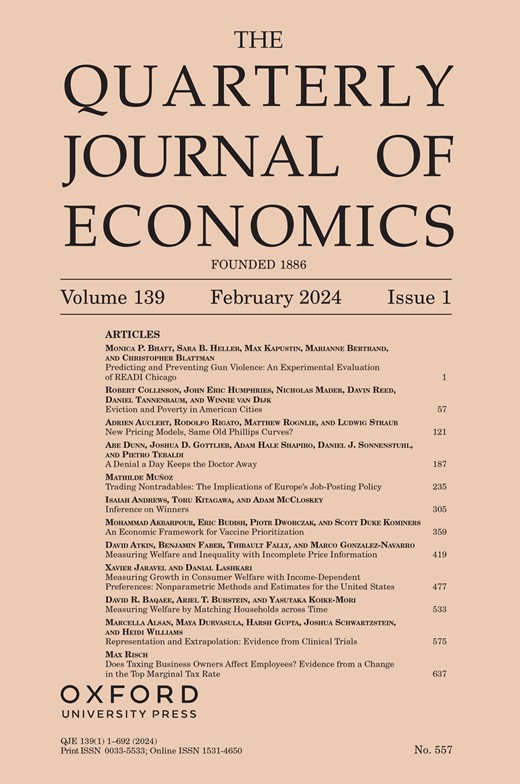自我刻板印象的证据和思想的贡献
IF 12.7
1区 经济学
Q1 ECONOMICS
引用次数: 218
摘要
我们使用实验室实验来探索预测个人决定将其想法贡献给团队的因素。我们发现,贡献决策取决于与决策领域相关的性别和性别刻板印象的相互作用:在测量能力的条件下,个人不太愿意在其性别领域之外的刻板印象中贡献想法。重要的是,这些决定很大程度上是由自我评估驱动的,而不是对歧视的恐惧。个人在性别不一致的领域缺乏自信,因此不太愿意贡献自己的想法。因为即使是非常有知识的小组成员在性别不一致的类别中贡献不足,小组的表现也会受到影响,而且在此之后,小组很难识别谁是最有才华的成员。我们的研究结果表明,即使在其他群体成员没有表现出偏见的环境中,女性在男性类型领域和男性在女性类型领域的影响力也可能较小。对女性(男性)在男性类型(女性类型)领域的能力提供反馈的干预并不会显著增加她为团队贡献想法的可能性。一项粗略的计算表明,“向前一步”式的政策,增加女性的贡献,将显著提高男性主导领域的群体表现。JEL代码:J16, C92。本文章由计算机程序翻译,如有差异,请以英文原文为准。
Evidence on Self-Stereotyping and the Contribution of Ideas
We use a lab experiment to explore the factors that predict an individual’s decision to contribute her idea to a group. We find that contribution decisions depend on the interaction of gender and the gender stereotype associated with the decision-making domain: conditional on measured ability, individuals are less willing to contribute ideas in areas that are stereotypically outside of their gender’s domain. Importantly, these decisions are largely driven by self-assessments, rather than fear of discrimination. Individuals are less confident in gender-incongruent areas and are thus less willing to contribute their ideas. Because even very knowledgeable group members undercontribute in gender-incongruent categories, group performance suffers and, ex post, groups have difficulty recognizing who their most talented members are. Our results show that even in an environment where other group members show no bias, women in male-typed areas and men in female-typed areas may be less influential. An intervention that provides feedback about a woman’s (man’s) strength in a male-typed (female-typed) area does not significantly increase the probability that she contributes her ideas to the group. A back-of-the-envelope calculation reveals that a “lean in”–style policy that increases contribution by women would significantly improve group performance in male-typed domains. JEL Codes: J16, C92.
求助全文
通过发布文献求助,成功后即可免费获取论文全文。
去求助
来源期刊

Quarterly Journal of Economics
ECONOMICS-
CiteScore
24.20
自引率
2.20%
发文量
42
期刊介绍:
The Quarterly Journal of Economics stands as the oldest professional journal of economics in the English language. Published under the editorial guidance of Harvard University's Department of Economics, it comprehensively covers all aspects of the field. Esteemed by professional and academic economists as well as students worldwide, QJE holds unparalleled value in the economic discourse.
 求助内容:
求助内容: 应助结果提醒方式:
应助结果提醒方式:


